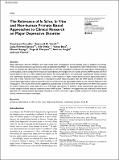Files in this item
The relevance of in silico, in vitro and non-human primate based approaches to clinical research on major depressive disorder
Item metadata
| dc.contributor.author | Carvalho, Constança | |
| dc.contributor.author | Varela, Susana A.M. | |
| dc.contributor.author | Bastos, Luísa Ferreira | |
| dc.contributor.author | Orfão, Inês | |
| dc.contributor.author | Beja, Vanda | |
| dc.contributor.author | Sapage, Manuel | |
| dc.contributor.author | Marques, Tiago A. | |
| dc.contributor.author | Knight, Andrew | |
| dc.contributor.author | Vicente, Luís | |
| dc.date.accessioned | 2019-12-18T13:30:06Z | |
| dc.date.available | 2019-12-18T13:30:06Z | |
| dc.date.issued | 2019-12-16 | |
| dc.identifier | 264572105 | |
| dc.identifier | a83ee92d-606b-4073-8c64-1e664c7b6976 | |
| dc.identifier | 85076551692 | |
| dc.identifier | 000503025500005 | |
| dc.identifier.citation | Carvalho , C , Varela , S A M , Bastos , L F , Orfão , I , Beja , V , Sapage , M , Marques , T A , Knight , A & Vicente , L 2019 , ' The relevance of in silico , in vitro and non-human primate based approaches to clinical research on major depressive disorder ' , Alternatives to Laboratory Animals , vol. 47 , no. 3-4 , pp. 128-139 . https://doi.org/10.1177/0261192919885578 | en |
| dc.identifier.issn | 0261-1929 | |
| dc.identifier.other | RIS: urn:E28B2226FE9B9B46D0630B218CA15787 | |
| dc.identifier.other | ORCID: /0000-0002-2581-1972/work/66398297 | |
| dc.identifier.uri | https://hdl.handle.net/10023/19157 | |
| dc.description | This study was financed by Animalfree Research–Switzerland, and by Portuguese national funds through FCT–Fundação para a Ciência e a Tecnologia, within the CFCUL Unit funding UID/FIL/00678/2013. TAM received partial support from CEAUL (funded by FCT–Fundação para a Ciência e a Tecnologia, Portugal, through the project UID/MAT/00006/2019). Open access publication costs were covered by Animalfree Research–Switzerland and by funding provided by the Ketty and Leif Hjordt Foundation. | en |
| dc.description.abstract | Major depressive disorder (MDD) is the most severe form of depression and the leading cause of disability worldwide. When considering research approaches aimed at understanding MDD, it is important that their effectiveness is evaluated. Here, we assessed the effectiveness of original studies on MDD by rating their contributions to subsequent medical papers on the subject, and we compared the respective contribution of findings from non-human primate (NHP) studies and from human-based in vitro or in silico research approaches. For each publication, we conducted a quantitative citation analysis and a systematic qualitative analysis of the citations. In the majority of cases, human-based research approaches (both in silico and in vitro) received more citations in subsequent human research papers than did NHP studies. In addition, the human-based approaches were considered to be more relevant to the hypotheses and/or to the methods featured in the citing papers. The results of this study suggest that studies based on in silico and in vitro approaches are taken into account by medical researchers more often than are NHP-based approaches. In addition, these human-based approaches are usually cheaper and less ethically contentious than NHP studies. Therefore, we suggest that the traditional animal-based approach for testing medical hypotheses should be revised, and more opportunities created for further developing human-relevant innovative techniques. | |
| dc.format.extent | 12 | |
| dc.format.extent | 298210 | |
| dc.language.iso | eng | |
| dc.relation.ispartof | Alternatives to Laboratory Animals | en |
| dc.subject | Animal use alternatives | en |
| dc.subject | In silico | en |
| dc.subject | In vitro | en |
| dc.subject | Major depressive disorder | en |
| dc.subject | Non-human primate | en |
| dc.subject | Three Rs | en |
| dc.subject | BF Psychology | en |
| dc.subject | QH301 Biology | en |
| dc.subject | QL Zoology | en |
| dc.subject | 3rd-DAS | en |
| dc.subject.lcc | BF | en |
| dc.subject.lcc | QH301 | en |
| dc.subject.lcc | QL | en |
| dc.title | The relevance of in silico, in vitro and non-human primate based approaches to clinical research on major depressive disorder | en |
| dc.type | Journal article | en |
| dc.contributor.institution | University of St Andrews. School of Mathematics and Statistics | en |
| dc.contributor.institution | University of St Andrews. Scottish Oceans Institute | en |
| dc.contributor.institution | University of St Andrews. Centre for Research into Ecological & Environmental Modelling | en |
| dc.identifier.doi | 10.1177/0261192919885578 | |
| dc.description.status | Peer reviewed | en |
This item appears in the following Collection(s)
Items in the St Andrews Research Repository are protected by copyright, with all rights reserved, unless otherwise indicated.

